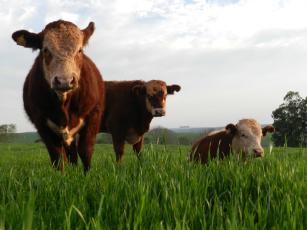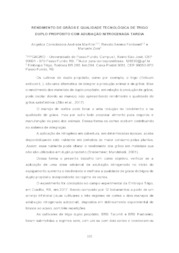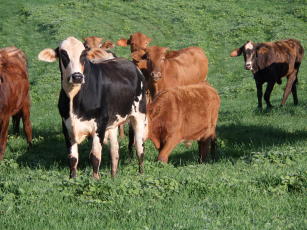Cereais de inverno no planejamento forrageiro para ruminantes
Winter cereals in forage planning for ruminants

Photo: ANTUNES, Joseani Mesquita
Forage planning is a strategy to reduce livestock food shortages throughout the year through the diversified supply of pasture and conserved fodder. Embrapa provides both winter and summer annual and perennial grass and legume cultivars, with peak production at different times of the year that, associated with management practices, make up integrated technological solutions and valued by rural producers. A relevant part of forage planning is especially due to winter cereals, such as dual-purpose wheat, rye, oats, and ryegrass, all of which play a crucial role in providing food in autumn and winter seasons in southern Brazil, which is important for the sustainability of the milk and meat production chains when there is a shortage of natural or even cultivated pastures. The agricultural practice consists of a combination of genetics and management practices. The genetics are composed of the cultivars: BRS Pastoreio and BRS Tarumã dual-purpose wheat; BRS Serrano and BRS Progresso rye; BRS Madrugada and BRS Centauro oats; and BRS Ponteio and BRS Integração ryegrass. The management aspects that make up the technological solution are mainly related to guidelines on establishing, conducting, and using forage either for grazing or to be preserved as hay or whole plant, pre-dried or grain silage.
This technological solution was developed by Embrapa in partnership with other institutions
This technological solution was developed by Embrapa in partnership with other institution(s).
Where to find:
Embrapa Trigo
BR 285, KM 294, Passo Fundo/RS,
CEP: 99050-970, Caixa Postal: 3081
Fone: +55 (54) 3316-5800
Agricultural practice: For grazing management Launch year: 2018
Country: Brazil Region: South State: Paraná, Rio Grande do Sul, Santa Catarina Biome: Atlantic Rainforest, Pampa
Responsible Unit: Embrapa Wheat
Participating Units: Embrapa Dairy Cattle, Embrapa Soybean, Embrapa Temperate Agriculture, Embrapa Southern Livestock


